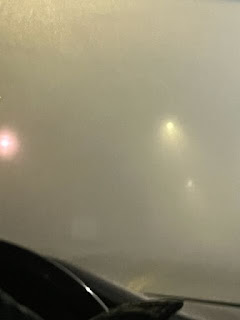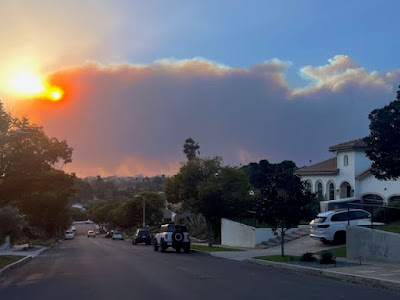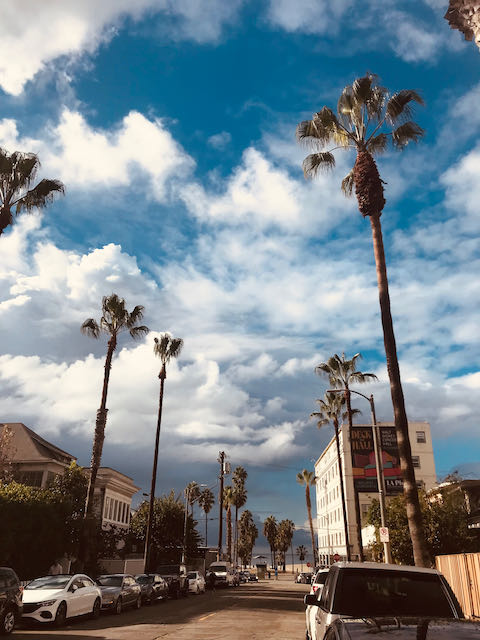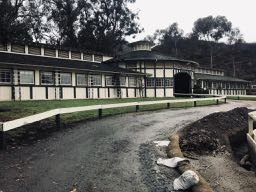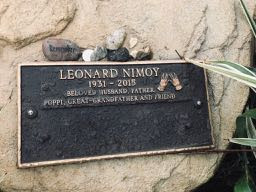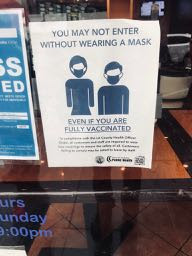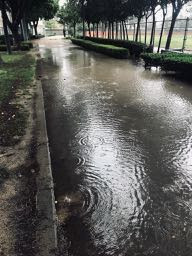We're back in Anchorage. As we went to the airport in the late afternoon Friday, there seemed to be a lot less smoke blowing from the Palisades fire toward the ocean. By the time we took off, it was dark out and while we sat on the wrong side of the plane, we could still see the flames through the window on the other side as we banked to the north. It was the first time we saw actual flames.
I grew up in LA and my mom lived in our house for 65 years. So I know the area fairly well. Especially the west side where the Palisades fire is. I've seen huge changes over time and I have some thoughts, having been in LA when the fire started.
We discovered KCAL on the radio while we were driving - which had the most up-to-the-minute and detailed coverage of the fires. You can watch the KCAL coverage here. I listened again this morning from here in Anchorage. I know the places they're talking about, but even if you don't it's pretty addicting and I don't recommend watching more than 15 minutes at a time.
History - Marquez, Will Rogers State Park, UCLA, Santa Monica Pier
Here's a recent map from the Los Angeles County Emergency site. These maps keep being updated. I've done a screenshot of an area of importance to me. The orange is mandatory evacuation areas. The yellow is a warning area - be ready to evacuate. I'd note I was still getting alerts on my phone as we were headed to the airport.
My mom's house is down at the bottom, just below the Santa Monica Airport which is the border between SM and Los Angeles. It's a long way off from the mandatory evacuation area. It probably doesn't look that far, but the fire is mostly in mountainous areas - large lots, hillsides covered with (now) dry brush. The land between mandatory evacuation and be ready to evacuate areas and my mom's house is much more urban. Directly above my mom's house is the concrete and asphalt runway of the Santa Monica Airport.
I went to school at UCLA. As you can see, the Evacuation Warning area touches the northwest corner of the campus.
My last two years at UCLA, I was a noon duty aide and afterschool playground director at Marquez Elementary School. It's one of two schools that burned down Thursday. Every day, about 11:30am I took off from UCLA and rode along Sunset to Marquez Elementary School. Sometimes I napped in the nurse's office between lunch and after school duty. Other times I rode the last mile or so of Sunset to the beach where I played volley ball and body surfed.
One of my favorite places in LA was Will Rogers State Park. This was the great Cherokee cowboy/actor/humorist's estate where he could escape Hollywood. It had his house and other buildings including a large stable for horses and a polo field. And the surrounding area had beautiful hiking trails. It was pretty much the only thing around when I first went there. I remember seeing quail there. This picture is from a 2011 blog post. More pictures of the area around the Will Rogers estate are in a 2021 post. It appears to have all been destroyed. Will Rogers died in a plane crash with Wiley Post, in 1935 outside of what was then called Port Barrow, Alaska.Today's map has the evacuation line right up to the ocean for a good part of it. But at downtown Santa Monica, the air was relatively clear and was still reasonably so a couple of miles north of the pier. I rode beyond the pier until I could see that up ahead the smoke was down on the highway and bike trail. I didn't need to get that close to thick smoke. But you can see, in the picture below, a runner, without a mask, heading for it. I'd note that as a Jr. High and High School student, LA air frequently looked like that and on the worst days, we'd get a pain in our chest when we breathed deep.
I'd also mention that Pacific Palisades was the home of "Weimar on the Pacific."
"In the 1930s and 40s, Los Angeles became an unlikely cultural sanctuary for a distinguished group of German artists and intellectuals—including Thomas Mann, Theodore W. Adorno, Bertolt Brecht, Fritz Lang, and Arnold Schoenberg—who had fled Nazi Germany. During their years in exile, they would produce a substantial body of major works to address the crisis of modernism that resulted from the rise of National Socialism."
If you don't know these names (and I acknowledge that most people probably don't, despite their being important cultural figures), and others mentioned in the linked book announcement, I'd urge you to google them. They're pretty remarkable people. My mother had connections to Schoenberg family through her work, and through the owner of the dress shop who was featured in the film Woman In Gold. who hired Schoenberg's grandson to represent her in her fight against the Austrian government to recover pictures stolen from her family by the Nazis. My mom shopped at her store and sent me clippings from the newspaper of the lawsuit while it was happening.
Another member of the group was Leon Feuchtwanger. When I was a high school or college student, my father took me to visit an older German woman in West Los Angeles or possibly Santa Monica. Close to the yellow evacuation warning area today. I could be wrong, but I believe this was Leon Feuchtwanger's widow, Marta. (My father also fled Nazi Germany in the 1930s.)
The End, But Not The End
I wanted this to be one integrated post, tying a number of different ideas together. But while I think some of my readers could read on beyond this, I've got several more topics and there is already a lot in the links to explore. So I'll save the others for tomorrow and maybe the next day.
Coming:
1. Development in the hills - Why have people built way up in this area known for fires?
2. Pacific Palisades and Malibu, and now Brentwood ( especially Mandeville Canyon), Encino on the valley side are some of the wealthiest neighborhoods in Los Angeles, probably the US. Would we be paying such close attention if this were a poorer neighborhood? Would a poorer neighborhood be getting all the resources coming in to help like this?
3. The idea of ownership and loss - humans are short term inhabitants on earth. We don't 'own' the earth, or anything else really. We are the temporary guardians until the 'properties' are lost, sold,, destroyed, stolen, or by the death of the people who believe they own them.
4. Phone Alerts - I kept getting loud alerts on my phone with warnings to evacuate immediately
5. How television news (in particular) distort reality by showing the most sensational snippets and ignoring the fact that most people are going on with their lives normally.
6. Warning to Anchorage hillside residents, and people everywhere who live in wooded hillsides. Or any area that is threatened by nature's reaction to Climate Change.




